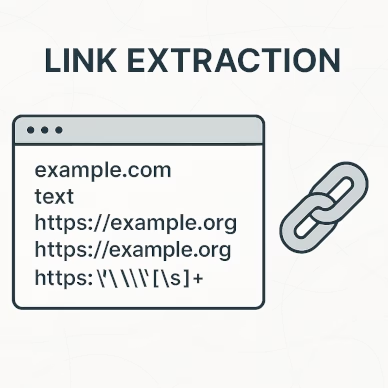This handy URL extractor that can help you locate and collect the links present in any given text.
If you are tidying up your writings, compiling research data, or conducting a backlink audit, this tool can be of great help as it will perform the task in no time.
All you need to do is paste your text into the box provided and then click on ‘Extract Links.’
The extracted links will then be displayed for your use. Users have the choice of either copying the results or downloading them as a .txt or .doc file to be stored for later use.
Links / URLs Extractor out of text
Tool Suites:
| SEO Tools | Server Tools | Text Tools | Development Tools | More |
Regex
If you want to use advanced filtering in the URL extractor using regex, you will need to know at least a little bit about regex, which normallly stands for regular expressions. Regular expressions are search patterns and with them you can search for complex sequences of characters. They come in handy when you want to extract URLs to set parameters for the text you want to clean.
Copy the text into the text box first. Next, in the ‘regex’ column, type the regex pattern that corresponds to the URLs or text fragments you want to extract. For example, to extract only HTTPS links, you could use:
https:\/\/[^\s]+
This specific pattern matches sequences of characters beginning with https:// and then any characters that are not whitespace.
Use this pattern if you want to extract the domain names from the URLs:
(?:https?:\/\/)?(?:www\.)?([^\/\s]+)
This captures the domain part of a URL, ignoring the protocol and subdirectories.
After entering the pattern, press the “Regex Replace” button. The tool will scan the input for matches to the pattern and replace them with the content of the “Replace” field. The tool will inform you of a problem with the pattern if no matches are found.
Regular expression syntax does vary with implementation, but case sensitivity is the same everywhere. By default, capital and small letters differ. If you want to ignore case, use casing operators (changing the pattern, or equivalently the matching text, to one case only) or flag i (this tool does add flag g, which is global matching, by default).
When extracting data from an HTML file, for example, it makes more sense to use regex. It is also useful for fixing inconsistencies, pulling out certain fields, or reformatting data.


